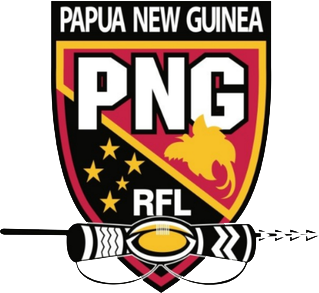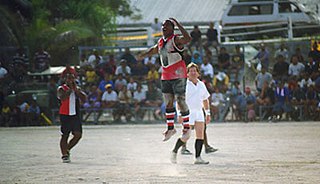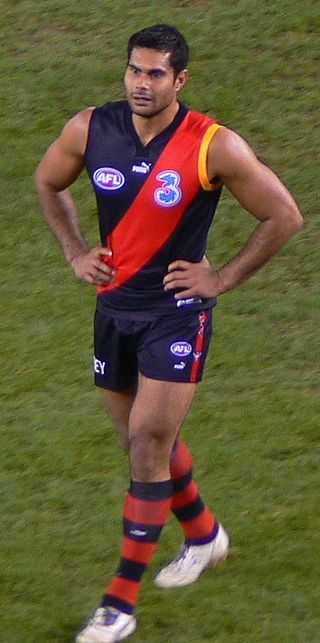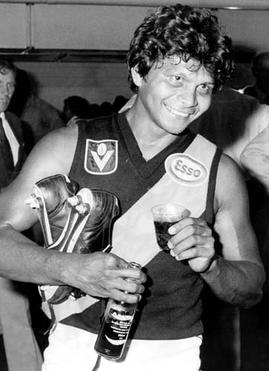| Flying Boomerangs | |
|---|---|
| Names | |
| Full name | Flying Boomerangs |
| Club details | |
| Founded | 1973 |
| Colours | Black Red Yellow The Aboriginal colors. |
| Other information | |
| Official website | |
The Flying Boomerangs are the underage Indigenous Australian Australian rules football team for men (the underage women's team is known as the Woomeras). The team has played tests against junior teams from Papua New Guinea, South Africa, New Zealand and developing pacific nations.
In 2013, the Flying Boomerangs toured to play the South African national Australian rules football team [1] in both Australia and South Africa. They toured Papua New Guinea, the first international team to defeat them in Australian rules football [2] and also New Zealand winning both matches. [3]
The team is named after the aboriginal hunting tool, the boomerang. The senior equivalent team is the Indigenous All-Stars.
Apart from representing Australia in international Australian Rules Football, the Flying Boomerangs team members have gone on to play in the Australian Football League.
Other tours include Papua New Guinea (2009), Tonga (2010) and Fiji (2011) to compete against the underage Oceania and Pacific Islands teams. Andrew Mcleod (head coach) and Chris Johnson (assistant coach) were also part of the team in 2010. In 2017 Barry Lawrence was named head coach and Harry Miller as assistant coach.
The Flying Boomerangs have been featured nationally in a documentary on ABC TV during their tour to South Africa.
| Year | Date | Opponent | Result | Stadium | Captain (vice-captain) | Coach | Best | Crowd | Notes/References |
|---|---|---|---|---|---|---|---|---|---|
| 2017 | December | New Zealand Academy | Flying Boomerangs 26.9 (165) def New Zealand Academy 3.2 (20) | Outer Oval, North Harbour Stadium | Frank Szekely | [4] | |||
| 2017 | December | South Pacific All Stars | Albert Park (Suva) Fiji | Barry Lawrence | |||||
| 2013 | December | | Flying Boomerangs 16.23 (119) def New Zealand 2.3 (15) | Hutt Park Wellington, New Zealand [5] | |||||
| 2013 | February | South Pacific Nations | Flying Boomerangs 13.5 (83) def South Pacific 10.9 (69) | Blacktown International Sportspark [6] | |||||
| 2013 | January | | Flying Boomerangs 17.15 (117) def South Africa 4.8 (32) | Durban [7] | |||||
| 2011 | Fiji | Andrew Mcleod | |||||||
| 2010 | Tonga | ||||||||
| 2010 | South Africa (Coastal Squad) | Flying Boomerangs 17.10 (112) def. South Africa (Coastal Squad) | Nyanga Cricket Ground, Cape Town | ||||||
| 2010 | South Africa (Inland Squad) | Flying Boomerangs 9.13 (67) def. South Africa (Inland Squad) 8.9 (57) | Mohadin Cricket Ground, Potchefstroom | ||||||
| 2009 | Central Highlands (Papua New Guinea) | Flying Boomerangs 7.10 (52) def. Central Highlands 2.2 (14) | University of Papua New Guinea Port Moresby, Papua New Guinea | 8,000 | |||||
| 2009 | | Flying Boomerangs 9.11 (65) def. by Papua New Guinea (U18) 9.12 (66) | Lae, Papua New Guinea [8] | 2,500 | |||||
| 2008 | | Flying Boomerangs 11.10 (76) def. South Africa 8.9 (57) | |||||||
| 2008 | | Flying Boomerangs 19.9 (123) def. South Africa 2.11 (23) |

The Papua New Guinea national rugby league team represents Papua New Guinea in the sport of rugby league football.
The Australian Football International Cup is a triennial international tournament in Australian rules football. It is the biggest international tournament in the sport that is open to all nations. More than 26 nations have participated and the competition has expanded into multiple pools and both men and women's divisions. At the time of the last tournament in 2017, the sport had a record 170,744 registered players outside Australia growing at a rate of 25 per cent per annum.

Australian rules football in Nauru dates back to the 1910s. Australian rules football became the national sport of Nauru after its independence in 1968. Today, its national participation rate is over 30%, the highest in the world.

The Geography of Australian rules football describes the sport of Australian rules football played in more than 60 countries around the world. By 2017 more than 26 nations had contested the Australian Football International Cup, the highest level of worldwide competition.

The South African national Australian rules football team represent South Africa in the sport of Australian rules football.

Malcolm Robert Michael is a Papua New Guinean-born former Australian rules footballer. He is notable for his successful professional career in the Australian Football League. In a career spanning 238 games and three clubs in two Australian states he is best known as a triple premiership full-back with the Brisbane Lions. Michael is recognised as being one of the best Queensland produced Australian rules footballers of all time, being named on the AFL Queensland Team of the 20th Century.

The Papua New Guinea national Australian rules football team represents Papua New Guinea in the team sport of Australian rules football. It is one of the nation's most successful sporting teams, currently ranked 2nd in the world behind Australia.
The Indigenous All-Stars is an Australian rules football team composed of players that identify as Indigenous Australian or with an indigenous culture.

Australia has named a senior Australian rules football team, known as the All-Australian team since 1947. This team, however has never officially played an international Australian rules football match. This is primarily because the sport is played professionally in Australia.

Australian rules football in Papua New Guinea (PNG) is a developing team sport which was initially introduced by Australian servicemen during World War II. The governing body for the sport is the PNG Rules Football Council, with the development body being AFL PNG. The junior development version is known locally as Niukick. Regionally, AFL PNG is affiliated with AFL Oceania.

AFL South Africa is the governing body and federation for Australian rules football in South Africa. Its name is due to its formal affiliation in 2004 to the AFL Commission the game's world governing body.

Australian Football in the Northern Territory is the most popular sport, particularly with indigenous Australian communities in Darwin, Alice Springs and the Tiwi Islands. It is governed by AFL Northern Territory.

Australian rules football is the most watched and attended sport and the second most participated code of football in Australia. Since originating in Victoria in 1858 and spreading elsewhere from 1866, it has been played continuously in every Australian state since 1903 plus the two major territories since 1916.

Maurice Joseph Rioli Sr. was an Australian rules footballer who represented St Mary's Football Club in the Northern Territory Football League (NTFL), South Fremantle in the West Australian Football League (WAFL) and Richmond in the Victorian Football League.

The Papua New Guinea women's national soccer team is controlled by the Papua New Guinea Football Association (PNGFA). Its nickname is the Lakatois, which is a Motuan sailing vessel. Their home ground is the Sir Hubert Murray Stadium, located in Port Moresby and their current manager is Peter Gunemba. Deslyn Siniu is the team's most capped player and top scorer.

The 2008 Australian Football International Cup was the third time the Australian Football International Cup, an international Australian rules football competition, has been contested.

Nathan Krakouer is a former professional Australian rules footballer who played for the Port Adelaide Football Club and Gold Coast Football Club in the Australian Football League (AFL). He is the nephew of former North Melbourne football players Jimmy Krakouer and Phil Krakouer and cousin of former Richmond and Collingwood player Andrew Krakouer.

Austin Wonaeamirri is a professional Australian rules football player of indigenous (Tiwi) origin. He previously played for the Melbourne Football Club in the Australian Football League (AFL).

Jarman Impey is a professional Australian rules footballer playing for the Hawthorn Football Club in the Australian Football League (AFL). He previously played for the Port Adelaide Football Club from 2014 to 2017.

Callum Ah Chee is an Australian rules footballer who plays for the Brisbane Lions in the Australian Football League (AFL).